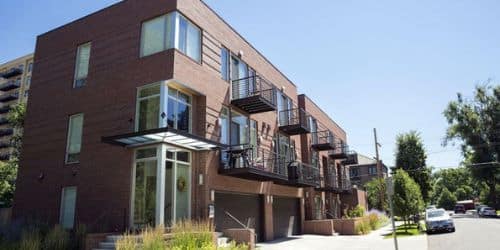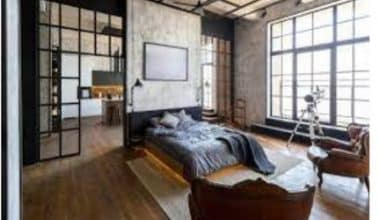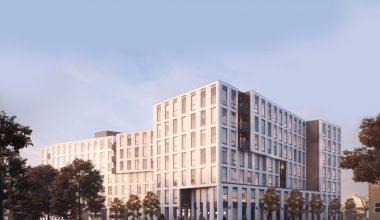A condo, an apartment, and a townhouse differ in size and affordability, with rules guiding each one, as well as regarding security and privacy. This guide will highlight the differences between condo vs. apartment vs. townhouse vs. duplex.
Condo Vs Apartment Vs Townhouse Vs Duplex
In a structure, a condo is a unit that one can sell. First-time homebuyers, individuals, and senior citizens who usually travel may find condos to be an attractive alternative because of the low upkeep requirements. There are several similarities between condos and apartments, including the fact that they are probably going to share boundaries with other residents.
Advantages of Condo
One of the many benefits that acquiring a condo can give you is affordability. Read on to find out many other things you stand to gain in a condo!
#1. Low-Cost Coverage
If you live in a condo, your quarterly HOA dues assist you by insuring where you reside (the building), so property insurance is just required to protect the contents of your unit. A house, on the other hand, necessitates both interior and exterior coverage. As a result, condo coverage or insurance is generally less expensive than house insurance.
#2. Home Appliances
Appliances that range from refrigerators, stoves, and laundry facilities are frequently required as part of the purchase of a home. You can certainly include these appliances in the transaction, but if you ever want to put your house up for sale again, you’ll have to bring everything up to standard. Most condominiums are already equipped with this equipment, and in certain circumstances, their maintenance is paid for by maintenance management, which is a huge perk of living in a condominium complex.
#3. A Better Option than Single-Family Homes
For first-time homebuyers, a condo can be a more reasonable option than a single-family home, especially in popular areas like the city center or along the coast. Purchasing or renting a condo in some cities is more affordable than an apartment or even purchasing a townhouse.
#4. A Strong Sense of Belonging
There are common areas like kitchens, terraces, and roof gardens in most condo structures and communities where tenants may mingle and create rapport with one another to create a better relationship among themselves. Aside from that, many condominium complexes organize social gatherings for their residents, including movie evenings, game sessions, and dinner parties. Now, that sounds like a lot of fun!
#5. Adaptable Ways of Life
If you’re looking to downsize from a bigger place or are on a budget, then a semi-condo is a great option for you. Individuals who prefer to travel or simply take in the sights of their city can do so with greater ease in a more affordable and comfortable small home. Therefore, they are freed from the burden of home maintenance.
#6. Extraordinary Facilities
Even if you don’t live in a high-end apartment, you can still take advantage of some pleasant features. You don’t have to bother about maintaining amenities like a pool, a rooftop patio, or a fitness facility if you live in a condo. Tennis courts and spas are also available in some units for those who enjoy them. A condominium complex’s HOA (homeowners association) cost will increase as a result of the many more facilities it offers.
#7. Maximum Protection
Generally, condos feature locked doors, CCTV cameras, and security officers to keep a watch on the premises. People who live alone and those with children will appreciate this feature the most.
#8. Convenience Places of interest and Commercial Areas
When you live in a condo in a downtown location, you’re just a short walk away from some of the best restaurants, bars, and shopping in the city. This means that you’ll be able to stroll to your workplace, eateries, cafes, public transportation, significant attractions, and a slew of events and activities.
Disadvantages of Condo
With all the benefits you have seen so far, there is still a downside to it
#1. No Privacy
Even after getting to know your neighbors, you can’t have the privacy you truly desire. The possibility of hearing your neighbors wandering across their condos, playing loud TVs or animals, or even throwing parties is high. And even if you don’t want them to, they might hear you doing some stuff too. This may not be a problem for folks who are used to living in condos. But if you’re short on cash but still want a peaceful place to call home, a condo might not be the best choice.
#2. Lack of Room for Storing Things
Lack of storage space may be a drawback for tenants who need to keep their belongings safe and accessible. If you don’t have a storage unit attached to your condo, you may have to minimize your belongings or find a new place to live if you want extra room. Storage space is rentable, which will be less expensive than relocating to a bigger condominium.
#3. There Are HOA Dues
Condominium owners face additional costs such as monthly homeowners association dues (HOA dues), which cover everything from facilities and amenities to building maintenance and upkeep. In addition, if you use more facilities, your HOA dues will likely climb.
Read also: HOA FEES : Considerations Before Buying
#4. Limited Parking Space
Parking is virtually always a problem because condos are usually located in metropolitan areas. Parking for guests or a commercial van may be tough to come by if you just have one allotted parking space for your apartment complex. Meanwhile, you can still park in car parks or parking areas, which is an extra expense you have to make monthly or yearly.
#5. Following Set of Rules
Owners of condominiums are subject to a number of restrictions. For instance, you can’t place solar on your rooftop, you can’t park anywhere you see space or drink in the common spaces.
Apartment
It’s common for a property management organization to own an apartment instead of managing it. According to the situation, it could be in a single-family home or a large complex.
Apartment complexes all have the same layout, and the same landlord, and all of the residents observe the same requirements for obtaining a flat in the same building. The front desk of the community is where all tenants respond to single property management.
Renting or buying an apartment gives you more freedom when it comes to negotiating your lease terms. If you don’t decide to live in one place for a lengthy period of time, this is a fantastic option. Renting an apartment is also a great way to get a feel for a new place before making a long-term commitment.
Advantages of Apartment
Here are some of the advantages of apartment living that you should be aware of.
#1. Financial
The financial component of renting an apartment is by far the most appealing feature of this type of housing. A renter’s monthly payment is typically less expensive than a homeowner’s monthly payment. Other monetary factors, including maintenance and utility costs, are often lower due to the smaller area and total duty of an owner and a renter.
#2. Maintenance
In terms of monetary advantages, maintenance costs are typically lower because the owner is usually responsible for them. Since they handle the lawn, you don’t have to worry about shoveling snow or maintaining an overgrown lawn. Renting provides a level of mental freedom that can’t be matched.
#3. Safety
Apartment buildings, in addition to providing their occupants with a sense of security, make significant investments in the protection of their occupants. There is no better place for unmarried women, children, households, and older men and women to live than in a multi-unit building, thanks to the immediate vicinity of neighbors and the usual security precautions that come with apartment complexes.
#4. Dimension
The dimensions of an apartment are super comfortable. As a recent college graduate, you’ll likely be searching for a spot to call your own; a sitting room, bedroom, bathroom, and perhaps even a kitchen for show. It’s not necessary for this room to be enormous or luxurious; it just has to feel cozy and safe. Students, singles, and even buddies who want to live in close quarters share this fundamental urge.
#5. Less Responsibility
Renting instead of owning a home will prevent you from getting the problems and issues that come with owning a home. Rather than fixing the boiler, a much-needed exotic island getaway can be taken advantage of.
#6. Accessibility
Everything you need is within a short distance of your apartment home. The general population of a community tends to decide on the location of shopping centers. The more potential customers there are, the greater the need for a retail complex to accommodate them. It’s a good idea to keep this tidbit handy. There is a retail mall close by to meet your needs, no matter what they may be.
Most people may agree that flats are the ideal living arrangement for those in need of permanent residence.
Disadvantages Of Apartment
#1. Little Space
Apartments tend to have a smaller total floor area, with bedrooms that are smaller than in a residence. They usually don’t have personal open spaces, except if there is a balcony. A small apartment may not be the best option for those who have kids.
#2. More Noise, Less Privacy
Having a large number of people living together means more noise and less privacy in a home. Both in the home and in public areas, this rule holds true.
#3. Strata Fees and Regulations
Those that reside in an apartment building will have to adhere to a set of rules about noise, the usage of shared areas, and other aspects of their flat. As a property owner, you’ll be responsible for paying monthly strata fees to cover the cost of maintaining common areas. From $500 to hundreds of dollars per quarter, expenses can be incurred.
#4. Availability of Parking
Parking near a house can be difficult if you don’t live in a structure with designated spots. The price of parking is going to rise if you want to get a space.
TownHouse
Most commonly, a townhouse is a two-or three-story building that has common boundaries with other neighbors. Townhouses are usually built in a single building, with split boundaries on both sides so that residents can have a sense of privacy. According to the most recent census data, about 6% of all U.S. housing units are townhouses.
Townhouse Overview
- Several residential units are joined by common boundaries on either side of a single residential unit.
- There is only one owner per townhouse unit, and each owner owns the land.
- There are usually two to three stories in height.
- Depending on the circumstances, the owner may be responsible for both the internal and external maintenance of the building, while the HOA is in charge of the common spaces and the disposal of waste.
- Because of the lower building costs and greater density, a townhouse is usually cheaper than a single household or a duplex.
Advantages of Townhouse
- When compared to a duplex, a single unit is more cost-effective and avoids the headache of being a landlord.
- With a townhouse, you have the option of owning the land as well as having a small amount of yard space. In a house, you’ll typically have more privacy than you would in a condominium.
The Disadvantages of a Townhouse
- With shared boundaries, you may have to work out upkeep agreements with your neighbors, particularly if there are problems that impact a large number of units.
- A single-story townhouse may not be the best choice if you desire to live in a multi-story building.
A Duplex
A duplex is a type of property that has two separate residences, each with its own separate garage, in a single building.
Advantages
Purchasing a duplex may be the most cost-effective option if you’re looking to relocate to a satisfactory community or school district. As a result, a steady flow of rental income can be an excellent long-term investment.
A duplex might cost more upfront than a townhouse, but the return on investment (ROI) can sometimes be seen right away because rental revenue can allow you to pay down your mortgage more quickly. Another perk of owning a duplex is that you and your household can live there at the same time. A duplex can be a great investment for you and your household. You can also choose to rent it out while living there as well.
Disadvantages
Being a landlord will probably be the biggest change in your life if you decide to buy a duplex. In order to become a homeowner and a landlord at the same time, you’ll need a lot of help. You have a lot of responsibilities as a landlord, including being ready to make repairs when they are necessary, adhering to local rules governing safe living conditions, and advertising the property to attract tenants.
A duplex may be more of a problem for privacy than a townhouse since the exterior space is generally shared. Having frank discussions with potential tenants about their personal information is the best approach to avoid privacy concerns.
Condo Vs Apartment Vs Townhouse Vs Duplex: The Difference
A townhouse is distinct from a duplex or a condo, although the distinctions between the four types of dwellings can be murky at best. Before you go house-looking, there are a few points to keep in mind about each style of home!
#1. Duplex
A duplex provides you with complete ownership of two separate properties on the same piece of property, and upkeep and maintenance boil down to you.
#2. Townhouse
Single-family homes can be purchased within a row of townhouses that share boundaries. If you live in a condominium, you’ll likely be responsible for much of the upkeep of your unit’s interior and exterior.
#3. Condo
Condos allow you to own a unit in a shared complex of residences, but you still have your own private space. HOA dues cover the care of common facilities and exterior repairs, so you’ll only have to worry about keeping up with the interior of your own home.
#4. Apartment
If you’re looking for a place to call home but don’t have the money for a down payment, an apartment is the best option for you.
Is the Apartment the Same As Condo?
Ownership is the main distinction between a condo and an apartment. Apartments are characterized as rented homes, frequently found in larger residential buildings. A condo is a unit within a larger residential complex that is similar to an apartment in structure but is owned rather than rented.
What Is the Difference Between a Townhouse and a Townhome?
A townhouse is a style of architecture also referred to as a townhome. It’s a multi-level house that has walls on one or both sides that are shared with other houses. If you own your townhouse, you also own the house’s exterior and the ground it is built on.
Which Is Cheaper Townhouse or a Condo?
Due to the lack of land, condos are frequently less expensive than townhouses; the exterior and land are seen as common areas shared by all inhabitants. Due in part to the fact that they include outside care, homeowner association (HOA) costs for condo owners can be much more than those for townhomes.
Do You Pay Monthly for Condos?
Before purchasing a condo, prospective purchasers should think about the condo fees and any potential special assessments that would need additional money. Typically, monthly payments are required for fees, which are set by a board of directors made up of condo owners.
Is a Condo Just a Flat?
A condominium, which can be a flat/apartment or a standalone house, is often a private residence that is rented out to tenants. However, the term “condo” exclusively refers to apartments and flats in modern usage. Additionally, since condominiums are owned and rented by individuals, the process of renting a condo is more intimate and personalized.
Why Are Townhouses Better?
Residents of townhomes pay less in property taxes than those of conventional homes because of the reduced lot size. In comparison to condos, homeowners association dues also frequently are less expensive. Townhome ownership is equivalent to single-family home ownership. The residence can be financed or purchased outright with cash.
Why Is Townhouse Called a Townhouse?
The term “townhouse” first appeared in early English, where it described a home a family (often royalty) held “in town” (i.e., London) while residing in the countryside.
Is a Townhouse Bigger Than a Condo?
Townhouses typically have two or three floors and more square footage than condominiums. In contrast to a condo, where you just purchase the interior, when you purchase a townhouse, you also purchase the land on which they are built. As a result, townhouses typically have higher list prices.
Conclusion
To choose the right residence (condo vs apartment vs townhouse vs duplex), there are certain factors to consider, like finance, marital status, and others that are in this guide.
FAQ
What is the difference between a townhouse and apartment?
The management and organization of the structure is the major distinction between a townhouse and an apartment. Townhouses are independent structures that resemble typical homes. Apartments are sections of larger buildings that house entire communities within their walls.
What are the disadvantages of townhouses?
Townhouses are frequently constructed as a part of neighborhoods or gated communities. The cost, HOA and shared amenities, and close closeness to neighbors are benefits of townhouse living. Townhouse living has drawbacks such as fewer space, less control over how your home looks, and less privacy.






